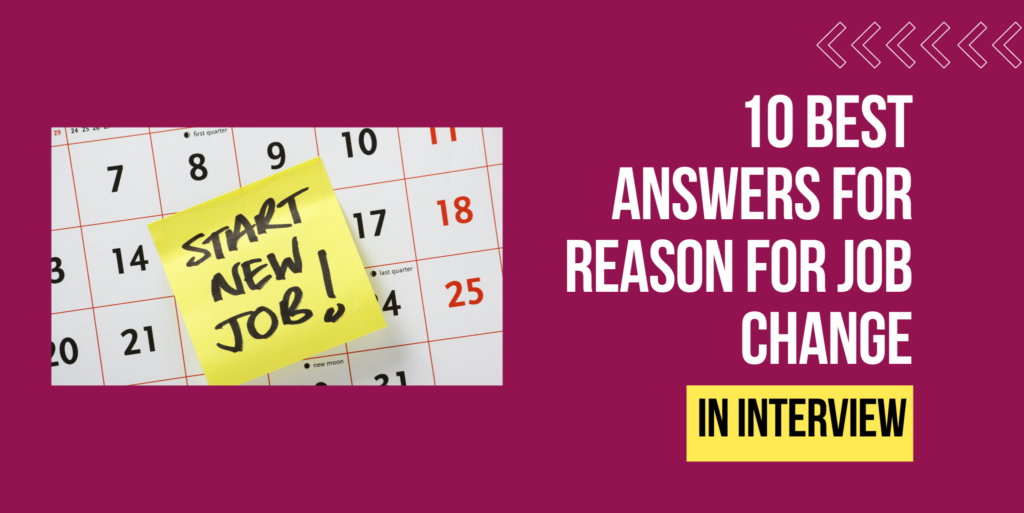Reason for Job Change
Many professionals today are no longer content with working for a single company throughout their entire careers. In fact, a recent survey found that 82% of professionals plan to re-evaluate their career paths in 2024 Additionally, data from the US Bureau of Labor Statistics indicates that the average American holds 12.4 different jobs between the ages of 18 and 54.
Navigating job changes and discussing them during an interview can be difficult. To help you out, we’ve compiled a list of the most effective ways to explain your reasons for job changes, including tips on what to do and avoid, as well as some sample responses to guide you through the process
Career advancement: The opportunity for professional growth and higher level roles.
The most common reason for job change is the opportunity for career advancement. This could include a promotion, a more senior role, or the chance to work with a more reputable company.
Better compensation: The opportunity for higher salary, benefits or flexible schedule.
Another common reason for job change is the opportunity for better compensation. This could include a higher salary, better benefits, or a more flexible work schedule.
Increased job satisfaction: The chance for more fulfilling and meaningful work.
Sometimes, job changers are looking for a role that is more fulfilling or offers greater job satisfaction. This could include a role that aligns more closely with their personal values, or one that allows them to work on projects that are more interesting or meaningful to them.
Location change: Relocating for personal or family reasons.
Some job changers are looking for a role that is closer to home, or that allows them to relocate to a new city or country. This could be motivated by family reasons, or simply a desire for a change of scenery.
Improved work-life balance: The opportunity for more flexible hours and vacation time.
Many job changers are looking for a role that offers a better work-life balance. This could include a role that offers more flexible hours, more vacation time, or more opportunities for remote work.
Change in industry or field: A desire to gain new skills or experience in different field.
Some job changers are looking to transition into a new industry or field. This could be driven by a desire to gain new skills or experience, or a desire to pursue a new career path.
Company culture: A better alignment of values and beliefs with the new employer.
Job changers may also be motivated by a desire to work for a company with a better culture or values. This could include a company that prioritizes employee well-being, promotes diversity and inclusion, or has a strong commitment to sustainability.
Personal reasons: Reasons such as family or personal projects that require a job change.
Some job changers may have personal reasons for wanting to make a change, such as caring for a family member or pursuing a passion outside of work.
Forced to leave: Job termination or company downsizing that results in job loss.
Some job changers may be forced to leave their current role due to downsizing, restructuring, or other reasons beyond their control.
Entrepreneurial aspirations: The desire to start own business or become an entrepreneur.
Some job changers may be looking to start their own business or become an entrepreneur.
It’s important to note that some of the reasons for job change may overlap and that everyone’s situation is unique. It’s also crucial to have a clear and honest explanation for your reason for job change in an interview setting, highlighting how it aligns with the new opportunity and how you can bring value to the new employer.
How to add job change reason in resume?
When including a reason for job change in a resume, it’s important to be honest and concise.
Here are a few examples of how to include a reason for job change in a resume:
- “Seeking career advancement opportunities”
- “Looking for better compensation and benefits package”
- “Relocated to [city/state] for personal reasons”
- “Pursuing new challenge in [industry/field]”
- “Desiring a better work-life balance”
You don’t need to go into too much detail about the reason for job change, it’s just to give a brief idea about why you have changed the job.
How do you justify changes in a job interview?
When discussing job changes in an interview, it’s important to be honest, positive and confident about your reasons for leaving your previous positions. Here are a few tips for how to justify changes in a job interview:
- Emphasize growth and development: Highlight how the job changes have helped you grow and develop professionally.
- Show alignment with the position: Explain how your past job changes align with the position you are applying for, and how you can bring the skills and experience you gained to the new role.
- Be positive: Avoid discussing any negative aspects of your previous positions, instead, focus on the positive aspects of why you left and what you gained from the experience.
- Provide context: If you have frequent job changes, provide context for why you have had multiple short-term jobs.
- Be prepared: Come to the interview prepared to discuss your job changes in a positive and professional manner.
- Be honest: If you were let go from a job, be honest about the reason, but avoid placing blame on others, instead, focus on what you learned from the experience and how you have grown since then.



